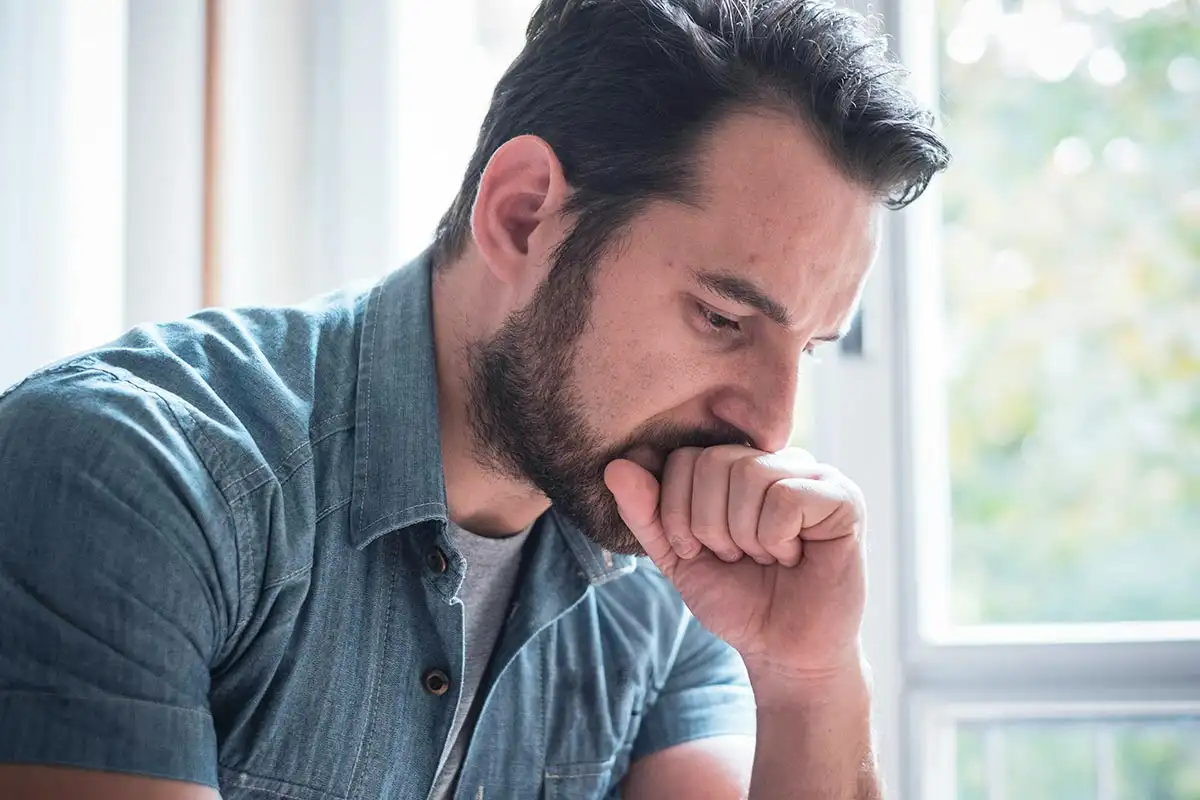
When Your Adult Child is Addicted: Advice for Parents in Orange County
Medically Reviewed by:

Dr. Marco M. Zahedi
Medical Director, Compassion Recovery Center

Dr. Michael Majeski
Licensed Psychologist (LP), Compassion Recovery Center
Table of Contents
Navigating the Path When Your Adult Child Faces Addiction
Discovering that your adult child is struggling with addiction can be one of the most painful and challenging experiences a parent can face. The dreams you held for them, the hopes for their future, can feel overshadowed by worry, fear, and a sense of helplessness. If you’re a parent in Orange County grappling with this reality, please know you are not alone. Addiction doesn’t discriminate; it touches families from all walks of life, in every community. The impact reverberates through the entire family, often leaving parents feeling isolated and overwhelmed. Addressing these issues head-on, with compassion and informed action, is crucial. This journey is difficult, but understanding addiction, recognizing its impact, and knowing where to find effective Orange County addiction help can illuminate the path toward healing and recovery, not just for your child, but for your entire family.
The journey through an adult child’s addiction is fraught with complex emotions and difficult decisions. Many parents find themselves asking, “What did I do wrong?” or “How can I fix this?” It’s vital to understand that addiction is a complex brain disorder, not a moral failing or a reflection of your parenting. While the situation is incredibly challenging, there is hope. Specialized treatment, including innovative approaches like Remote IOP California programs, offers accessible and effective ways to support your child’s recovery. At Compassion Recovery Center, we understand the unique struggles families in Orange County face, and we are dedicated to providing comprehensive, remote care that fits into your lives, offering a beacon of hope when things feel darkest. This guide aims to provide you with adult child addiction advice, helping you understand the road ahead and the resources available to you.

Understanding Addiction in Adult Children
Addiction, clinically known as Substance Use Disorder (SUD), is a chronic, relapsing brain disorder characterized by compulsive drug seeking and use despite harmful consequences. It’s not a choice or a lack of willpower. Addiction changes brain structure and function in ways that make quitting incredibly difficult without professional help. For adult children, this can manifest in various ways, often disrupting their careers, relationships, health, and overall well-being. Recognizing the signs is the first step towards helping them. These signs can be physical, behavioral, or psychological.
Physical signs might include unexplained weight loss or gain, changes in sleep patterns (insomnia or excessive sleeping), bloodshot eyes or dilated pupils, poor physical coordination, slurred speech, or neglect of personal hygiene. Behavioral signs often involve a sudden change in friends, withdrawal from family activities, unexplained financial problems or frequent requests for money, secretive behavior, loss of interest in hobbies, or a decline in work or academic performance. Psychologically, you might notice mood swings, increased irritability or agitation, anxiety, depression, paranoia, or a general lack of motivation. If you’re observing a cluster of these signs, it’s essential to consider the possibility of substance use. You can always start your free assessment with a professional to discuss your concerns.
In Orange County, like many other communities, adults may struggle with a range of substances. Alcohol remains one of the most commonly abused substances, often due to its social acceptability and widespread availability. Opioids, including prescription painkillers (like OxyContin and Vicodin) and illicit drugs like heroin and fentanyl, continue to be a significant concern, leading to devastating consequences. Stimulants such as cocaine and methamphetamine are also prevalent, as is the misuse of prescription stimulants like Adderall or Ritalin. Marijuana use, while legal in California, can still lead to addiction for some individuals, particularly with high-potency products. It’s also important to be aware of the potential for addiction to sedatives or tranquilizers (benzodiazepines like Xanax or Valium) and the emerging concern of Social Media Addiction Treatment, which though not a substance, shares similar compulsive behavioral patterns. Understanding these trends can help contextualize what your child might be facing and guide you towards appropriate Drug Rehab Programs or Alcohol Rehab Programs.
Several psychological and social factors can contribute to an adult child’s vulnerability to addiction. Co-occurring mental health conditions, such as depression, anxiety, bipolar disorder, or PTSD, are very common. Many individuals turn to substances as a way to self-medicate the symptoms of these underlying Mental Health Treatment issues, a condition known as Dual Diagnosis Treatment. Past trauma, whether from childhood or adulthood, can also significantly increase the risk. Social factors include peer pressure, even in adulthood, a family history of addiction (which can have genetic and environmental components), and high-stress lifestyles or careers. The transition into adulthood itself, with its pressures of independence, career building, and relationship forming, can sometimes trigger or exacerbate substance use. Understanding these contributing factors is crucial, not to assign blame, but to approach the situation with empathy and to ensure that any treatment plan addresses these root causes.
Emotional Impact on Parents
The emotional toll on parents whose adult children are struggling with addiction is immense and multifaceted. It’s a silent sorrow, often carried with a brave face to the outside world, while internally, a storm of emotions rages. Common feelings include profound sadness and grief for the child they knew and the future they envisioned. Guilt is a heavy burden, with parents often replaying scenarios, wondering if they could have done something differently. Shame and embarrassment can lead to isolation, preventing parents from seeking support from friends or other family members. Fear is a constant companion – fear for their child’s safety, their health, their future, and even their life. Anger and frustration are also natural reactions, directed at the child, the addiction, or the perceived helplessness of the situation. Anxiety about what each day might bring, or what a ringing phone late at night might signify, can become chronic.
It’s crucial for parents to find healthy coping mechanisms to manage this overwhelming stress and anxiety. One of the first steps is acknowledging these feelings without judgment. Suppressing them only intensifies the pain. Talking about your emotions with a trusted friend, family member, therapist, or in a support group can be incredibly validating and relieving. Practicing mindfulness and relaxation techniques, such as deep breathing exercises, meditation, or yoga, can help manage acute anxiety and promote a sense of calm. Engaging in regular physical activity is also a powerful stress reliever. Remember, these are tools not to erase the pain, but to help you navigate it without being consumed by it. If you feel overwhelmed, consider seeking professional Contact Us for guidance on family support services.
Perhaps the most vital, yet often overlooked, aspect for parents is self-care. When your child is in crisis, it’s natural to want to pour all your energy into helping them. However, neglecting your own well-being will eventually lead to burnout, making you less effective in supporting anyone. Self-care isn’t selfish; it’s essential. This means ensuring you’re getting enough sleep, eating nutritious meals, and maintaining some semblance of your own routines and interests. It means setting aside time for activities that bring you joy or peace, even if it’s just for a short period each day. It might also mean seeking your own therapy or counseling to process your emotions and develop coping strategies. By taking care of yourself, you model healthy behavior, preserve your strength, and maintain the resilience needed for the long journey of supporting a loved one through recovery. Your well-being is intrinsically linked to your ability to offer sustained, healthy support.

Communication Strategies
Communicating with an adult child struggling with addiction is one of the most challenging aspects for parents. Conversations can quickly become battlegrounds, filled with anger, denial, blame, and frustration. However, learning and practicing effective communication techniques can make a significant difference in maintaining a connection and encouraging your child to consider help. The goal is to create an environment where they feel heard and understood, even if you don’t condone their behavior. One of the most powerful tools is using “I” statements instead of “you” statements. For example, instead of saying, “You’re always disappointing me,” try, “I feel worried and sad when I see you struggling.” This expresses your feelings without attacking or blaming your child, reducing defensiveness.
Active listening is equally important. This means truly hearing what your child is saying, both verbally and nonverbally, without interrupting, judging, or immediately offering solutions. Reflect back what you hear to ensure understanding, for instance, “It sounds like you’re feeling really overwhelmed right now.” This validation can open doors for more honest dialogue. Choose the right time and place for these conversations – avoid talking when either of you is stressed, tired, angry, or if your child is under the influence. Aim for calm, private moments. You might find inspiration in resources like our blog post on communicating with a loved one about their substance use.
Setting boundaries is a critical component of healthy communication and a supportive environment. Boundaries are not about punishment; they are about self-preservation and defining what behaviors you will and will not tolerate. This is often referred to as “tough love,” but it’s more accurately described as loving detachment. It means loving your child while detaching from their addictive behaviors and the chaos they create. Clearly and calmly communicate these boundaries. For example, you might decide you will no longer provide financial bailouts, allow drug use in your home, or make excuses for their behavior. It’s crucial to be consistent in upholding these boundaries, even when it’s incredibly difficult. This consistency helps your child understand the natural consequences of their actions, which can be a motivator for change. Read more about setting boundaries to protect your sobriety, and adapt these principles to your situation as a parent.
Encouraging open and honest dialogue, even about difficult topics like addiction and treatment, requires patience and persistence. Reassure your child that you love them and are concerned for their well-being. Try to approach conversations from a place of support rather than confrontation. Ask open-ended questions that encourage them to share their thoughts and feelings, like “How are things really going for you?” or “What do you think might help?” Be prepared for denial, anger, or resistance. Addiction often makes individuals defensive and unwilling to acknowledge the problem. Don’t get discouraged. The aim is to keep the lines of communication open, however tentatively. Let them know that when they are ready to seek help, you will be there to support them in finding appropriate resources, such as exploring options for Virtual IOP Program in California. The door to communication should always remain open, even if the conversations are hard.
Seeking Professional Help
When addiction has taken hold, professional help is almost always necessary. The journey to recovery is complex, and trained professionals can provide the structured support, evidence-based therapies, and medical oversight needed for lasting change. For parents in Orange County, there are various treatment options available, and understanding these can help you guide your adult child toward the most appropriate care. Treatment typically occurs along a continuum of care, ranging from Outpatient Detox, which manages withdrawal symptoms safely, to more intensive programs.
Common levels of care include:
- Detoxification (Detox): Medically supervised withdrawal management to safely remove substances from the body. This is often the first step before further treatment.
- Residential Treatment (Inpatient Rehab): Provides 24/7 care in a live-in facility. This is suitable for individuals with severe addiction, co-occurring mental health conditions, or an unstable home environment.
- Partial Hospitalization Program (PHP): A highly structured program offering many hours of therapy per day, several days a week, while the individual lives at home or in sober living.
- Intensive Outpatient Program (IOP): Offers several hours of therapy per week, typically 9-15 hours, allowing individuals to continue with work, school, or family responsibilities.
- Outpatient Programs (OP): Less intensive than IOP, with fewer therapy hours per week, focusing on maintaining recovery and relapse prevention.
In recent years, telehealth addiction treatment has emerged as a highly effective and accessible option. Benefits of remote IOP and telehealth services, like those offered through Virtual IOP Program at Compassion Recovery Center, are numerous. Firstly, accessibility is a major advantage, especially for those in Orange County who might face transportation challenges or live in areas with fewer local facilities. Treatment can be accessed from the comfort and privacy of home. Secondly, flexibility allows individuals to integrate treatment into their daily lives, maintaining work or educational commitments. This can be particularly beneficial for adult children who have responsibilities they cannot easily abandon. Thirdly, telehealth can reduce the stigma associated with seeking treatment, as individuals can participate discreetly. Research has shown that virtual programs can be just as effective as in-person treatment for many individuals. We encourage you to reach out today to learn more about our innovative virtual rehab California options.
Choosing the right rehab center for your child is a critical decision. Consider the following factors:
- Accreditation and Licensing: Ensure the facility is accredited by reputable organizations (e.g., The Joint Commission, CARF) and licensed by the state of California.
- Evidence-Based Therapies: Look for programs that use scientifically proven methods, such as Cognitive Behavioral Therapy (CBT), Dialectical Behavior Therapy (DBT), and Motivational Interviewing.
- Individualized Treatment Plans: Addiction affects everyone differently. The program should tailor treatment to your child’s specific needs, including addressing any co-occurring mental health issues (Dual Diagnosis Treatment).
- Staff Qualifications: Inquire about the credentials and experience of the clinical team, including therapists, counselors, and medical staff.
- Family Involvement: Programs that include family therapy or education can significantly improve outcomes.
- Aftercare Planning: Recovery is an ongoing process. A good program will provide robust aftercare planning and support to prevent relapse.
- Program Philosophy: Ensure the program’s approach aligns with your family’s values and your child’s needs.
Compassion Recovery Center Services
At Compassion Recovery Center, we understand the immense courage it takes to seek help for addiction, both for the individual struggling and for their concerned family members. Our mission is to provide accessible, high-quality, and compassionate care to individuals and families in Orange County and throughout California who are affected by substance use and co-occurring mental health disorders. We specialize in virtual rehab California, leveraging technology to bring comprehensive treatment directly to you, removing many of the traditional barriers to accessing care. We believe that recovery is possible for everyone, and our dedicated team is here to guide your adult child, and your family, on the path to healing and a brighter future.
We offer a range of services designed to meet diverse needs, all delivered through a secure and user-friendly telehealth platform:
- Remote IOP Program: Our Virtual Intensive Outpatient Program provides structured therapy for several hours a day, multiple days a week. This allows clients to receive intensive treatment while living at home and maintaining essential life commitments. It includes group therapy, individual counseling, and psychoeducation, all tailored to support recovery in a real-world setting. This is a cornerstone of our Remote drug rehab Orange County services.
- Online CBT Therapy: Cognitive Behavioral Therapy (CBT) is a highly effective, evidence-based approach for treating addiction and co-occurring mental health conditions. Our online CBT therapy sessions help clients identify and change negative thought patterns and behaviors that contribute to substance use, developing healthier coping skills.
- MAT Treatment Online (Medication-Assisted Treatment): For individuals struggling with opioid or alcohol addiction, MAT combines FDA-approved medications with counseling and behavioral therapies. Our medical team can assess and manage MAT remotely, providing a safe and effective way to reduce cravings and withdrawal symptoms, supporting sustained recovery. This is often integrated into our outpatient detox and IOP services.
- Virtual Couples Counseling & Family Therapy: Addiction profoundly impacts relationships. We offer virtual couples counseling rehab and family therapy sessions to help rebuild trust, improve communication, and create a supportive home environment conducive to recovery. Healing the family system is an integral part of the recovery process.
- Dual Diagnosis Treatment: Many individuals with substance use disorders also struggle with mental health conditions like depression, anxiety, or PTSD. Our integrated approach addresses both issues simultaneously, which is crucial for long-term recovery.
The advantages of choosing virtual rehab in California through Compassion Recovery Center are significant. The convenience and accessibility mean treatment can start sooner and fit more seamlessly into life. For busy professionals or parents in Orange County, this flexibility is invaluable. Our telehealth platform ensures privacy and confidentiality, allowing individuals to seek help without fear of stigma. Furthermore, by receiving treatment in their home environment, clients can immediately apply the skills and strategies they learn to real-life situations and triggers, fostering resilience and practical coping mechanisms. Our programs are designed to be engaging and supportive, creating a strong sense of community even in a virtual setting. We invite you to Verify Insurance or Contact Us to learn more about how our specialized remote services can provide the Orange County addiction help your family needs.
Supporting Your Child Through Recovery
Your role as a parent doesn’t end when your adult child enters treatment; in many ways, it transforms. Supporting them through the recovery process is a long-term commitment that requires patience, understanding, and a continued focus on healthy boundaries. Family support is consistently shown to be a significant factor in successful, long-term recovery. Your encouragement, empathy, and willingness to participate in their healing journey can make a profound difference. This doesn’t mean enabling or controlling, but rather offering a stable, loving presence as they navigate the challenges and triumphs of sobriety.
Encouraging active participation in therapy and support groups is vital. Whether your child is enrolled in a Remote IOP California program, attending 12-step meetings like AA or NA, or engaging in other forms of aftercare, consistent engagement is key. You can support this by:
- Expressing interest: Ask open-ended questions about what they are learning (if they are willing to share) without prying.
- Respecting privacy: Understand that some aspects of their therapy are confidential.
- Positive reinforcement: Acknowledge their efforts and commitment to attending sessions or meetings.
- Participating when invited: If family therapy is part of their treatment plan, such as virtual couples counseling rehab or family sessions, your active involvement can be incredibly beneficial.
- Helping with logistics (if appropriate): Sometimes, practical support like reminders or ensuring a quiet space for telehealth sessions can be helpful, but avoid taking over their responsibilities.
Monitoring progress and celebrating milestones are important aspects of the recovery journey. Recovery isn’t a linear path; there will be good days and challenging days. It’s important to acknowledge that setbacks or even relapses can occur. These are not failures but opportunities to learn and reinforce coping strategies. Focus on progress, not perfection. Celebrate the small victories along the way: a week sober, a month, completing a phase of treatment, handling a trigger successfully, or a positive change in attitude. These acknowledgments reinforce positive behavior and provide much-needed encouragement. Our blog on celebrating milestones why acknowledging your progress matters offers more insights into this. Remember, your consistent, loving support provides an anchor for your child as they rebuild their life. It’s also important to continue your own self-care and seek support for yourself through this process, as it allows you to provide healthier, more sustainable support to your child.
It’s also essential to understand that supporting recovery means fostering independence, not dependence. As your child progresses, allow them to take on more responsibility for their recovery and their life. Resist the urge to over-manage or shield them from all difficulties. Learning to navigate life’s challenges sober is a critical part of the process. Your role shifts from being a primary caregiver to being a supportive ally. This transition can be difficult, but it’s vital for their long-term well-being and self-efficacy. Continue to maintain healthy boundaries and open communication, and trust in the process and the skills they are learning. If you have questions about how to best support your child, don’t hesitate to get help now from professionals who can guide you.
Legal and Financial Considerations
Navigating an adult child’s addiction often brings with it a host of legal and financial questions and concerns for parents. Understanding your position and options can help alleviate some of the stress and enable you to make informed decisions. It’s important to remember that your adult child, legally, is an independent individual, which can limit your direct control over their choices and access to their information, but there are still ways you can be involved and supportive, particularly concerning treatment.
Legally, as the parent of an adult child (typically 18 or older), your rights to make decisions for them or access their medical information are limited by privacy laws like HIPAA (Health Insurance Portability and Accountability Act). Unless your child provides written consent, healthcare providers, including addiction treatment centers, cannot share detailed information about their diagnosis or treatment with you. However, many treatment programs, including Compassion Recovery Center, encourage family involvement and can facilitate obtaining this consent if your child agrees. In very extreme cases, where an adult child is gravely disabled due to their addiction and unable to care for themselves, options like a conservatorship (in California, often referred to as a Lanterman-Petris-Short or LPS conservatorship for mental health, or a probate conservatorship) might be explored, but these are complex legal processes requiring significant evidence and court intervention. It’s generally more productive to work collaboratively with your child regarding treatment. If legal issues arise due to their addiction (e.g., DUIs, possession charges), encourage them to seek legal counsel. You are not typically legally responsible for the actions of your adult child unless you have co-signed loans or otherwise entangled your finances.
Financial planning for addiction treatment is a significant concern for many families in Orange County. Treatment can be expensive, but it’s an investment in your child’s life and future. Start by exploring all available options. Many insurance plans provide coverage for substance abuse treatment, including Telehealth addiction treatment. It’s crucial to understand your specific policy benefits. You can often verify your insurance online through a treatment provider’s website or by calling the insurance company directly. Ask specific questions about coverage for different levels of care (detox, IOP, PHP), out-of-pocket maximums, co-pays, and any pre-authorization requirements. Understanding California’s parity laws, which generally require insurers to cover mental health and substance use disorder treatment at the same level as other medical conditions, can also be helpful. If insurance coverage is insufficient, discuss payment plans or financing options with the treatment center. Some individuals may qualify for state-funded programs or scholarships, though these can have waiting lists. Our Admissions Information page can provide a starting point for exploring these financial aspects.
When it comes to insurance coverage for telehealth services, the landscape has become much more favorable. Most major insurance providers in California now offer coverage for virtual mental health and substance abuse treatment, including Remote IOP California programs. This is a significant step in making treatment more accessible. When verifying benefits, specifically ask about telehealth or virtual care for substance use disorders. At Compassion Recovery Center, we work with many insurance providers and can help you navigate the verification process to understand your coverage for our virtual rehab California services. Addressing these legal and financial aspects proactively can reduce stress and allow the focus to remain on your child’s recovery journey.
Community Resources and Support
Navigating your adult child’s addiction can feel incredibly isolating, but it’s vital to remember that you are not alone. Orange County offers a variety of community resources and support systems specifically for families affected by substance use. Connecting with others who understand what you’re going through can provide immense comfort, practical advice, and a sense of shared strength. These resources can be a lifeline, helping you cope and learn how to best support your child while also taking care of your own well-being.
Local support groups are an excellent starting point. Organizations like Al-Anon and Nar-Anon are 12-step fellowship groups designed for families and friends of individuals struggling with alcoholism and drug addiction, respectively. These groups offer a safe, confidential space to share experiences, learn from others, and find emotional support. Meetings are typically free and widely available throughout Orange County. You can find meeting lists on their respective websites. Other parent-specific support groups may also exist, sometimes facilitated by local hospitals, community centers, or non-profit organizations focused on addiction. These groups emphasize that you didn’t cause the addiction, can’t control it, and can’t cure it, but you can learn to cope with its effects and detach with love.
In addition to local meetings, the digital age offers a wealth of online forums and communities for parents of addicted adult children. These platforms can be particularly helpful if attending in-person meetings is difficult due to scheduling, mobility, or even feelings of unease about local face-to-face groups. Websites like The Partnership to End Addiction, Shatterproof, and various Facebook groups dedicated to family support offer forums, articles, and resources. These online communities allow for anonymous sharing and support from a global network of parents facing similar challenges. While they don’t replace the intimacy of local groups for everyone, they can be a valuable supplement or alternative, offering Orange County addiction help and advice at any time of day or night. Remember to vet online groups for their tone and helpfulness, ensuring they promote healthy coping and support rather than negativity or enabling advice.
Accessing additional help and guidance is crucial. Beyond support groups, consider seeking individual therapy or counseling for yourself. A therapist specializing in family dynamics and addiction can provide personalized strategies for coping, communication, and boundary setting. Your family doctor or primary care physician can also be a source of referrals. For direct assistance in navigating treatment options for your child, organizations like Compassion Recovery Center are here to help. Our team can provide information not only about our Remote IOP California programs but also guide you towards other community resources that may be beneficial. Don’t hesitate to reach out today. We can help you understand the treatment landscape, verify insurance, and take the first steps toward getting professional help for your child and support for your family. Remember, asking for help is a sign of strength, and there is a community ready to support you.
The Journey Forward: Hope and Healing for Your Family
The journey of supporting an adult child through addiction is undoubtedly one of the most arduous paths a parent can walk. We’ve explored the complexities of understanding addiction, the profound emotional impact it has on parents, effective communication strategies, and the critical importance of seeking professional help. We’ve highlighted how services like those at Compassion Recovery Center, including Remote IOP California, online CBT therapy, and MAT treatment online, can offer accessible and effective solutions for families in Orange County. We’ve also touched upon the vital role of ongoing family support, managing legal and financial considerations, and leveraging community resources.
The key takeaway is this: there is hope. Addiction is a treatable disease, and recovery is possible. For parents in Orange County feeling lost and overwhelmed by their adult child’s addiction, we want to extend a message of profound encouragement. You are not alone in this struggle, and help is available, both for your child and for you. Taking the first step to seek information and support is an act of courage and love. It’s essential to prioritize your own well-being, establish healthy boundaries, and remember that you cannot control your child’s choices, but you can control your responses and offer support in healthy ways. Explore the telehealth addiction treatment options that provide flexibility and privacy, allowing your child to integrate recovery into their life.
Overcoming addiction is rarely a solitary endeavor; it often requires the collective effort of the individual, their family, and professional treatment providers. As a family, you can learn new ways to communicate, heal past wounds, and build a future free from the grip of addiction. While the path may be long and include setbacks, every step forward, no matter how small, is progress. We encourage you to get help now. Start your free assessment with Compassion Recovery Center today to explore treatment options or check insurance coverage for our specialized remote drug rehab programs in Orange County. Your family deserves healing, and your child deserves a chance at a life in recovery. Let us walk alongside you on this journey toward hope and renewal.
How to help your adult child with addiction?
What are some signs that my adult child is addicted?
How can I communicate effectively with my addicted child?
What treatment options are available for addiction in Orange County?
How does telehealth addiction treatment work?
What should I consider when choosing a rehab center?
How can I support my child during their recovery journey?
Are there any local support groups for parents in Orange County?
What legal rights do I have as a parent of an addicted adult child?
How can I manage the financial aspects of addiction treatment?
Struggling to balance life while needing support? Get expert virtual care and start your recovery journey, anytime, anywhere.
We’re learning more each day.
Researchers and doctors are making exciting progress in understanding mental health and addiction—bringing hope to millions.
Your genes don’t define you.
Genetics can play a part, but they don’t decide your future. Mental health is shaped by many factors, and healing is always possible.
There's no one-size-fits-all.
The right treatment often includes a mix of therapy, medication, and compassionate care—tailored just for you.


















